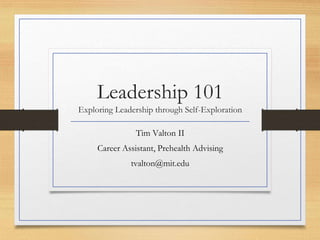
Leadership 101
- 1. Leadership 101 Exploring Leadership through Self-Exploration Tim Valton II Career Assistant, Prehealth Advising tvalton@mit.edu
- 2. Overview • Learning Outcomes • Style of the Presentation • Introduction to Leadership • Trait Approach to Leadership • Lecture-Based Description • Self Assessment & Discussion • Skills Approach to Leadership • Lecture-Based Description • Self-Assessment & Discussion • Questions, Comments, Concerns
- 3. Learning Outcomes • Identify key traits of leadership from a macro-level perspective • List key skills of leadership from a macro-level perspective • Examine the difference between “traits” and “skills” in reference to leadership development • Assess their own leadership through the lens of trait and skills approach and identify areas for improvement • Compile list of individualized leadership traits and apply them to their resume* • Construct list of leadership skills and be able to effectively articulate them* *Accomplished after the session through self-reflection
- 4. Style of Presentation • Four styles to accommodate different learning styles: • Rapid fire discussion: High participation needed; no wrong answers in rapid fire, all responses are valid • Lecture-Based Discussion: Low participation needed; I’ll provide some information about the different approaches; Feel free to take notes or listen, all information will be provided to you • Group Discussion: High/Low participation needed; I’ll ask you to chat with someone next to you during assessment instruments, feel free to report back to large group • Reflection after presentation: Low participation; I’ll send you some materials that you can either share with me for feedback or keep for yourself • Participation is crucial to learning experience • Intra-participation • Inter-participation
- 5. Rapid Fire Discussion #1 What is leadership? Remember: There are NO incorrect answers! Anything counts! Words, feelings, phrases, people, anything that comes to your mind!
- 6. Rapid Fire Discussion #2 What “skills” are associated with “good” leadership? Remember: There are NO incorrect answers! Anything counts! Words, feelings, phrases, people, anything that comes to your mind!
- 7. Introduction to Leadership • Two questions are the beginning of your journey through self-exploration of leadership • Trait Approach to Leadership • Skills Approach to Leadership • Basic level of leadership theory which is centered around the traits and actions of the leader • Limitations: There are more developed leadership theories out there (in my opinion “better”) but this is a good place to start your exploration
- 8. Trait Approach to Leadership • One of the first theories of leadership development • Focuses exclusively on the leader, not on the follower or the situation the leader is in • Concerned with what traits the leader exhibits and who has these traits within a group setting • Various studies of leadership traits and characteristics, but we’re going to focus in on “Big Five”
- 9. Five Leadership Traits •Intelligence- Strong verbal ability, perceptual ability, and reasoning •Self-confidence- Certain about one’s competencies •Determination- Desire to get the job done •Integrity- Quality of honesty and trustworthiness •Sociability- Inclination to seek out pleasant social relationships
- 10. Five Personality Factors • Neuroticism- tendency to be depressed, anxious, insecure, vulnerable, and hostile • Extraversion-tendency to be sociable and assertive and to have positive energy • Openness- tendency to be informed, creative, insightful, and curious • Agreeableness- tendency to be accepting, conforming, trusting, and nurturing • Conscientiousness- tendency to be thorough, organized, controlled, dependable, and decisive
- 11. Strengths of Trait Approach •Intuitively appealing- clearly fits within notion that leaders are the individuals out front and leading way in society* •Century of research to back it up- no other theory has the breadth of research compared to trait theory •Highlights the leader component in the leadership process- deeper meaning of what it means to be a “leader” •Benchmarks of what it means to be a leader
- 12. Self-Assessment Tool: Trait Approach • Read all instructions carefully • Answer honestly and with your “gut” • Once everyone has finished, pair up with someone next to you to briefly discuss and share: • What were some similarities? Differences? • Where were you the strongest? The weakest? • What is your most “important” trait? • Share with large group if you feel comfortable
- 13. Skills Approach to Leadership • Again, leader-centered perspective on leadership • Shift from focus on personality characteristics to skills and abilities that can be learned and developed • More tangible approach to leadership: • Skills can be defined as job descriptors in many ways • Critical to develop ability to talk about your skills effectively and efficiently
- 14. Basic Leadership Skills (Katz, 1955) • Technical Skill- Ability to work with things • Human Skill- Ability to work with people • Conceptual Skill- Ability to work with ideas • Leadership / Management structure has different needs of skills
- 15. Skill Based Model (Mumford, et. al., 2000)
- 16. Individual Based Attributes • General cognitive ability • Crystalized cognitive ability • Motivation • Personality
- 17. Competencies • Problem solving skills- ability to solve complex issues which stimulate organization growth • Social judgment skills- Capacity to understand people and social systems; Being multicultural competent; Ability to be perspective • Knowledge- Inextricably related to the application and implantation of problem-solving skills in organizations; Accumulation of information and the mental structures used to organize the information
- 18. Self-Assessment Tool: Skills Approach • Read all instructions carefully • Answer honestly and with your “gut” • Once everyone has finished, pair up with someone next to you to briefly discuss and share: • What were some similarities? Differences? • Where were you the strongest? The weakest? • What is your most “important” skill? • Share with large group if you feel comfortable
- 19. Discussion and Questions • The “So what”: Importance of leadership exploration from a career development perspective • Next steps: Look for an email from me with all of the resources used in this presentation • Any questions, comments, or concerns?